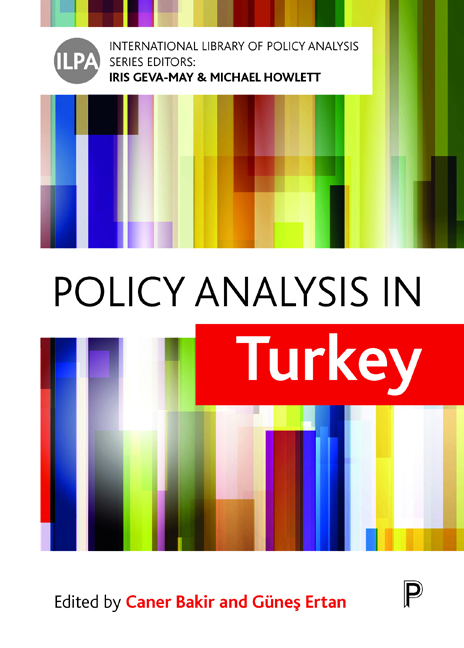Book contents
- Frontmatter
- Contents
- List of tables and figures
- Notes on contributors
- Editors’ introduction to the series
- one Pushing the pendulum from politics to policy: the state of policy analysis in Turkey
- Part One Historical roots, styles and methods of policy analysis in Turkey
- Part Two Policy analysis by governments
- Part Three Experts, international actors and public opinion
- Part Four Parties and civil society-based policy analysis
- Part Five Academic, bureaucratic and advocacy-based policy analysis
- Index
six - Territorial policy-making and administrative reform in Turkey
Published online by Cambridge University Press: 19 April 2022
- Frontmatter
- Contents
- List of tables and figures
- Notes on contributors
- Editors’ introduction to the series
- one Pushing the pendulum from politics to policy: the state of policy analysis in Turkey
- Part One Historical roots, styles and methods of policy analysis in Turkey
- Part Two Policy analysis by governments
- Part Three Experts, international actors and public opinion
- Part Four Parties and civil society-based policy analysis
- Part Five Academic, bureaucratic and advocacy-based policy analysis
- Index
Summary
Introduction
From a scholarly point of view, Turkey cannot be easily understood or discussed by using a conceptual model, because Turkish political and administrative structures are complex and under contradictory influences. Furthermore, this context is overcomplicated for local or state mechanisms such as public administration, which is already a complex system by nature.
After the 1980s, Turkey, a mostly capital-dependent country that displays economic progress, reformed its state structure significantly as a result of the liberalisation process. Within this context, deregulation and privatisation policies and their implementation are also attached to the liberalisation process in particular. Substantially, the implementation of these policies, with the effects of foreign actors such as the International Monetary Fund (IMF) and The World Bank as well as the prospect of membership to the European Union (EU), constitute the crucial dynamics of the reform or reconstruction process. This process, which began in the 1980s, has altered the characteristics of the relationships between central and local administrations within the unitary state structure. This alteration has been further impacted by the Europeanisation of public policies. In today's Turkey, even though the EU can no longer be regarded as an important actor influencing the administrative reform agenda via public opinion, it should be emphasised that it is still a critical actor in the evaluation of policies such as decentralisation and territorialisation, together with the influence of other international institutions. Of course, the motivation for EU compliance was not only economic for the ruling party. Europeanisation was considered a pragmatic tool to achieve the government's political agenda of eliminating internal pressure on the government, in terms of state reform agendas, and in the name of democratic standards and reputation promotion in international relations.
There are five crucial areas of state/governmental reform in Turkey's recent political history. These relate both to the main elements of state reform and also to the public policies that delineate the phases of the reconstruction process of the government in Turkey. The first area is public finance management reform, which was initiated in the 1990s. The second is local administrations reform. Third is public administration reform. The fourth, public personnel management reform, appears as a focus for many years, but remains an unrealised objective (Guler, 2003). The fifth reform of the governmental system, more specifically the significant ongoing process of transition to a presidential system, is proceeding.
- Type
- Chapter
- Information
- Policy Analysis in Turkey , pp. 87 - 104Publisher: Bristol University PressPrint publication year: 2018



